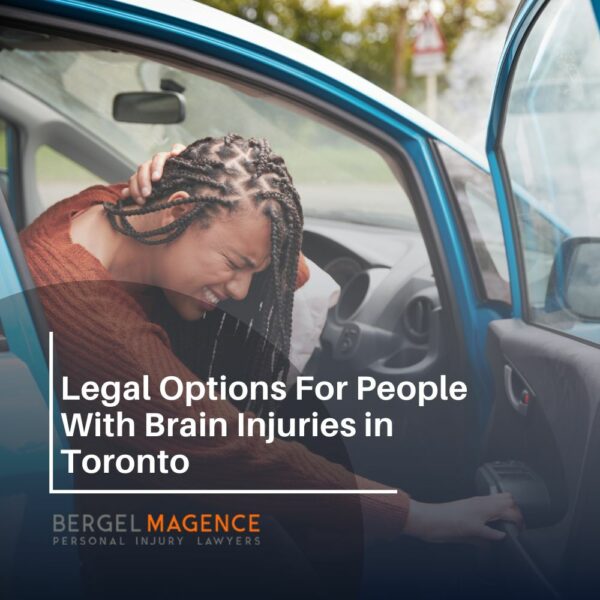
A brain injury throws your life, and the lives of those who love you, into turmoil. Everything changes – familiar routines become overwhelming, emotions feel harder to control, and your career and financial future may become uncertain. The physical symptoms of a brain injury, like headaches and memory loss, are challenging enough. Sadly, the financial strain of medical care and lost income can worsen the stress.
Canadian law recognizes the far-reaching impact of brain injuries. If your injury was caused by someone else – a negligent driver, an employer who disregarded safety, or a careless medical professional – you may have legal options to secure compensation. This compensation is designed to ease the financial burden of medical expenses, lost wages, and ongoing care, allowing you to focus on your recovery and rebuilding your life.
Understanding your legal rights after a brain injury is the first step toward regaining control. It can feel overwhelming to tackle the legal system while coping with your injury. That’s why securing specialized legal counsel is essential. Experienced brain injury lawyers, like the team at Bergel Magence, understand the complex nature of these injuries. They will fight to protect your rights and obtain the maximum compensation you deserve.
Common Causes of Brain Injuries Eligible for Compensation
Brain injuries can occur in various settings, and Canadian law acknowledges that when these injuries are the result of someone else’s negligence, victims deserve the chance to seek compensation. Here’s an in-depth look at some of the most common scenarios where a brain injury lawsuit may be possible:
- Car Accidents: The force of a car accident can jolt the brain violently within the skull. This can result in a wide range of brain injuries, from concussions to severe traumatic brain injuries (TBIs). Distracted driving, speeding, and driving under the influence significantly increase the risk.
- Workplace Accidents: Certain industries come with inherent dangers. Construction workers may fall from heights or be struck by falling objects. Factory employees can suffer head trauma due to equipment malfunctions.Employers must provide proper safety protocols and equipment to minimize these risks. If they fail in this duty,they may be held liable for resulting brain injuries.
- Slip and Fall Accidents: Property owners and businesses have a responsibility to maintain safe premises. A poorly lit parking lot, an icy sidewalk, or a spilled liquid on a store floor can all lead to slip and fall accidents. Even a seemingly minor fall can cause serious head trauma, particularly for older adults or those with pre-existing medical conditions.
- Medical Malpractice: While we trust doctors and surgeons with our lives, medical errors can tragically lead to brain injuries. Surgical mistakes, medication errors, missed diagnoses, and birth injuries can leave victims with permanent disabilities. Medical professionals are held to a high standard of care and can face a lawsuit when their negligence harms a patient.
- Sports Injuries: Contact sports like football, hockey, or boxing carry an inherent risk of concussions and other brain injuries. While some risks are inherent in sports, coaches, leagues, and equipment manufacturers have a duty to protect athletes from unnecessary harm. Recent research has also highlighted the long-term consequences of repeated head injuries, leading to increased scrutiny in how sports governing bodies handle concussion protocols.
Important!
- Identifying all liable parties: Sometimes it’s not just one person or company who bears responsibility. Multiple parties can potentially share liability for your brain injury, which is why a thorough investigation by a lawyer is often needed.
- Understanding types of brain injuries: Brain injuries vary in severity. Mild concussions may heal with rest.Catastrophic brain damage can leave victims needing lifelong care. Both mild and severe injuries can be eligible for compensation.
- Documenting everything: Medical records, photographs of the accident scene, and witness accounts will all be crucial when building a strong case.
What Types of Compensation You May Be Entitled To ?
A brain injury doesn’t just impact your immediate health; it can have a ripple effect across your life, affecting your finances, relationships, and future prospects. The purpose of compensation in a brain injury case is to address these diverse consequences and help you rebuild your life to the fullest extent possible. Here’s a breakdown of the types of compensation you may be able to seek:
Economic Damages
These cover tangible losses with direct monetary costs associated with your injury. They include:
- Medical expenses (current and future): Hospital stays, surgeries, doctor’s visits, medication, and rehabilitation therapies can be incredibly costly. Compensation goes beyond immediate bills; it helps ensure you have access to the specialized care you may need for years to come.
- Lost wages and loss of earning capacity: A brain injury may force you to miss work or prevent you from returning to your previous job. You could be entitled to compensation for lost wages and the decrease in your ability to earn a living in the future.
- Modifications to your home: Accessibility ramps, bathroom renovations, or widened doorways may become necessary after a brain injury. These costs can be included in your claim.
- Long-term care: If your injury leaves you unable to live independently, a long-term care facility may become essential. These facilities are expensive, and compensation can help cover those costs.
Non-Economic Damages
Recognizing the impact beyond just financial loss, these include:
- Pain and suffering: This acknowledges the physical discomfort, emotional distress, and reduced quality of life caused by the brain injury.
- Loss of consortium: A brain injury can impact your relationships with your spouse, children, or loved ones.Compensation may be available to address this.
The Importance of Expert Assessment
Identifying and calculating the full amount you deserve is where a specialized brain injury lawyer becomes invaluable.They understand the long-term consequences of brain injuries and will fight to secure compensation that addresses your needs, not just now, but throughout your lifetime. Brain injuries can affect cognitive function, emotional regulation, and personality – a lawyer will advocate for those ‘invisible’ damages that are just as important for your well-being.
Insurance companies often try to minimize payouts in brain injury cases – don’t let them. Contacting a personal injury lawyer early in the process helps protect your rights and ensures you receive the full compensation you’re entitled to for a stronger future.
Proving Negligence in a Brain Injury Case
To win a brain injury lawsuit, you need to prove that your injury was caused by the negligent or reckless actions (or lack of action) of another person or entity. Here’s how your legal team builds a strong case:
Understanding Negligence
This core legal concept has four main elements your brain injury lawyer will explain:
-
- Duty of care: Did the other person or company owe you a reasonable duty of care? For instance, drivers must obey traffic laws, property owners must maintain safe buildings, and doctors must abide by established medical standards.
- Breach of duty: Did they violate this duty? A distracted driver running a red light, a landlord ignoring a broken railing, or a doctor misreading an MRI would all be considered breaches of their respective duties of care.
- Causation: Did their breach of duty directly cause your brain injury? Could the brain damage have happened anyway, or was the negligent action the undeniable cause?
- Damages: Did you suffer losses as a result – medical expenses, lost wages, pain and suffering, etc.?
Gathering Evidence
Your legal team will work tirelessly to gather evidence supporting your claim. This includes:
-
- Medical records: These document the severity of your brain injury, treatments received, and the predicted long-term impacts.
- Witness statements: Did anyone witness the accident causing your injury (a car crash, a slip and fall)? Their testimony helps establish what happened.
- Accident reports: Police reports for car crashes or incident reports on business premises can be valuable evidence.
- Expert witnesses: Medical specialists, accident reconstruction experts, and vocational experts can offer crucial testimony regarding the extent of your brain injury and its impact on your life.
The Complexity of Brain Injuries
These injuries are notoriously difficult to diagnose fully in the immediate aftermath. Symptoms may evolve over time, revealing lingering cognitive deficits, or personality changes. A reputable brain injury lawyer understands these complexities. They might recommend reassessments later to support your claim for fair compensation.
Negotiating with Insurance Companies
Insurance companies often fight hard against brain injury claims, as they know the costs of these injuries can be high. Your lawyer understands how to deal with insurance adjusters,ensuring you’re not pressured into an inadequate settlement.
Important Points:
- Other causes of brain injuries: Sometimes, brain injuries aren’t the result of negligence, like strokes. An experienced legal team will determine if you have a claim.
- Seek immediate medical attention: This is crucial even for seemingly minor head injuries, as brain damage may not be immediately apparent.
- Contact a brain injury lawyer: Even if you’re unsure whether you have a case, a lawyer specializing in brain injuries should offer an initial consultation free of charge to discuss your situation.
Time Limits for Filing a Brain Injury Lawsuit
In Ontario, like all provinces, there are strict time limits for filing a personal injury lawsuit. These limits are what lawyers refer to as the “statute of limitations”. Understanding how these time limits work is crucial to protect your right to seek compensation. Here’s what you need to know:
The General Rule: In Ontario, the general limitation period for most personal injury lawsuits, including brain injuries, is two years from the date of the accident. This applies when the injury resulted from incidents like a motor vehicle accident, slip and fall, or another incident where someone else’s negligence is suspected.
- Exceptions: Situations exist where the limitation period may be extended. For instance:
- Delayed discovery: In some cases, the full extent of the brain injury may not be apparent immediately. The clock on the two-year limit might start later, from when you reasonably discovered, or should have discovered, the seriousness of the injury.
- Minors: If the injured person is a minor, the limitation period generally doesn’t begin until they reach the age of majority.
- Mental incapacity: Individuals lacking the mental capacity to manage their affairs may also have extensions to the limitation period.
- Important Considerations:
- Don’t delay: Even with the potential for exceptions, it’s always preferable to contact a brain injury lawyer as soon as possible after the injury. Early action allows crucial evidence to be preserved, strengthens your claim, and maximizes your chances of a successful outcome.
- Different types of claims: Ontario law may have shorter deadlines for certain claims, like those involving municipalities or accident benefits. A lawyer can advise you on the nuances of these rules.
- The Importance of Legal Consultation: Don’t attempt to figure out limitation periods on your own. Mistakes could forfeit your right to compensation altogether. An experienced personal injury law firm offers a free initial consultation to assess your situation and explain the applicable deadlines.
Why You Need a Specialized Brain Injury Lawyer
While any personal injury lawyer handles lawsuits, brain injuries present unique challenges and require specialized expertise. Here’s why partnering with a lawyer who focuses on brain injury cases is crucial:
- The complexity of brain injuries: The brain is incredibly intricate. Its function can be disrupted in various ways,leading to a wide range of physical, cognitive, and emotional symptoms. Some effects may be subtle, while others may be immediately obvious. A brain injury lawyer understands the nuances of these injuries and how they can evolve over time.
- Maximizing your compensation: Brain injuries often necessitate a lifetime of care. A skilled lawyer won’t just fight for your current medical bills but will work with medical experts to anticipate your future needs. They’ll advocate for compensation covering rehabilitation costs, lost earning potential, home modifications, in-home care,and other expenses that ensure you have the resources for long-term quality of life.
- Negotiating with insurance companies: Insurance companies are notorious for downplaying the severity of brain injuries or disputing if the victim’s symptoms are truly related to the accident. An experienced brain injury lawyer knows their tactics. They’ve built a network of trusted medical experts to bolster your case and won’t back down from ensuring you receive fair compensation.
- Guiding you through the process: The legal system is complex, especially when you’re struggling with the aftermath of a brain injury. A compassionate lawyer will explain the process, keep you informed at every stage, and handle the legal burdens so you can prioritize your recovery.
- Access to resources: Brain injury law firms often have established relationships with brain injury associations and rehabilitation specialists. They may be able to connect you with support services and resources that aid in your recovery process while your legal case is ongoing.
Contact Bergel Magence for a Free Consultation
We understand that the aftermath of a brain injury can feel overwhelming and isolating. You don’t have to face this challenging time alone. At Bergel Magence, our dedicated team of brain injury lawyers offers free consultations to help you understand your legal options and begin mapping a path forward.
We know that taking the first step can be daunting. That’s why we offer a compassionate, no-pressure environment where you can discuss your situation, ask questions, and learn how we may be able to help. Our aim is to empower you with knowledge while offering support as you make decisions about your future.
Securing the maximum compensation you deserve can alleviate financial stress and allow you to focus on what matters most – your recovery and well-being. Let us shoulder the legal burden so you can prioritize your health and your loved ones!



